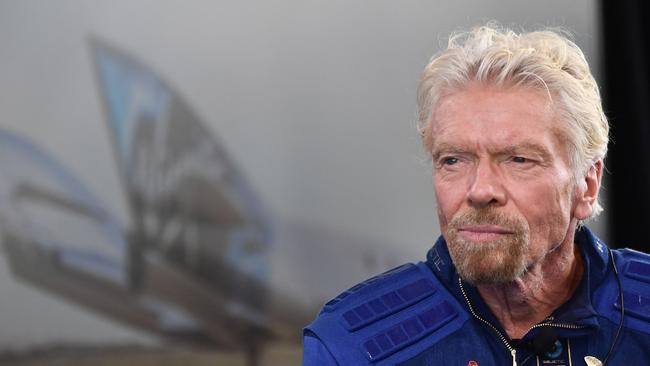Look up! It’s the space tourism industry

The smooth, roughly hour-long round trip from a New Mexico desert to the edge of space opens a new era of space travel and cements Virgin’s role as a leading player in the industry.
The Virgin Galactic flight, called VSS Unity, was carried some 50,000 feet aloft by a double-hulled, four-engine plane. Then Unity detached, blasting out of earth’s atmosphere at about three times the speed of sound, on an almost-vertical pitch.
At the peak altitude of about 57 miles, just short of what many consider the boundary of outer space, Branson and three fellow passengers experienced weightlessness for several minutes and took in sweeping views. Then the rocket headed down and re-entered the atmosphere, with movable wings controlling the glide back to the Virgin’s Spaceport.
Virgin Galactic’s stock has surged in recent weeks in anticipation of the flight. It has sent up spaceships before, but this trip was historic because it was the first crewed flight by any space tourism provider. Part of a test program ahead of commercial operations, the trip featured two pilots, plus four passengers, none of whom had to pay for the trip: the 70-year-old Branson and three Virgin Galactic employees: chief astronaut instructor Beth Moses, lead operations engineer Colin Bennett, and vice president of government affairs and research operations Sirisha Bandla.
The group’s safe return gives fresh credibility to space tourism – a field that promises to turn anyone with a couple hundred thousand dollars into an astronaut. Virgin says it has lined up about 600 reservations so far, with the early tickets going for $US250,000.
Analysts expect Virgin Galactic to do about $US3m in 2021 sales, and $US555m by 2025. But Branson won’t have the industry to himself: Jeff Bezos’ spaceflight company Blue Origin plans to launch its own trip on July 20, with Bezos aboard. That ship, New Shepard, is set to go even higher, 60 miles-plus above Earth to the Karman Line space boundary. Unlike Sunday’s Virgin Galactic trip, a paying passenger is slated to be on board New Shepard when it takes off. That person, whose name has not been disclosed, won the seat at an auction for $US28m.
As that price suggests, discounts on space tourism tickets are unlikely soon. Analyst Ken Herbert at Canaccord Genuity sees the prices of Virgin Galactic tickets rising to about $US500,000 a pop by 2030 as demand climbs. By then, Herbert predicts the company could generate about $US1.6bn in annual sales.
Sunday’s mission caps a long series of daring adventures by Branson. In 1987, he made the first successful trans-Atlantic manned hot-air balloon flight, though an emergency landing in the Irish Sea nearly killed him. In 1991 he made the first trans-Pacific hot-air balloon flight. Seven years later he attempted to be the first to fly around the world in a balloon but crash landed.
Branson has always been fascinated with aerospace. He founded his airline, Virgin Atlantic, in 1984 before launching Virgin Orbit in 2017, a launch services company that he hopes can compete with the likes of Elon Musk’s SpaceX, launching satellites into orbit for new commercial businesses.
SpaceX made history in May 2020 when it successfully sent two NASA astronauts into space in the first crewed launch from American soil since the US space shuttle was program retired in 2011. That trip, which also marked the first time NASA used a private space company for launch services, involved a rocket that could be reused for other flights. Reusability is also key for Virgin Galactic, which was founded in 2004. Each Galactic spacecraft is expected to make roughly 36 flights a year carrying about six passengers into space.
Musk joined Branson early Sunday morning. “Big day ahead. Great to start the morning with a friend. Feeling good, feeling excited, feeling ready,” Branson tweeted, showing a photo of himself standing in a kitchen beside Musk.
Amazon’s Blue Origin team has been less supportive, needling Virgin Galactic for not flying above the Karman Line. But Bezos sent congratulations to Branson and the Unity crew.
At current price levels, Galactic is trading for about 24 times Herbert’s estimated 2030 earnings. Meanwhile, the entire Nasdaq Composite, home to many richly valued technology stocks, trades for about 29 times estimated 2022 earnings.
But Galactic, with a market value of nearly $US12bn, has another trick up its sleeve. The company hopes to eventually deliver hypersonic travel, making jets that can go from London to LA in a couple of hours. That opportunity is large, but it’s far away. Morgan Stanley Adam Jonas believes hypersonic travel could be an $US800bn a year industry by 2040.
Worrying about businesses nearly 20 years down the road is a topic for another day. Now that the Unity’s flight is complete, Galactic scientists will pore over the data and ready the company for the start of commercial operations, which should come by the end of 2021.
This is an edited version of a feature which first appears in Barrons, with additional reporting by Connor Smith.



Richard Branson’s Virgin Galactic soared into history this week successfully completing the world’s first space tourism flight, with the billionaire entrepreneur strapped in for the ride.